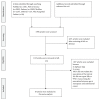Age at Menopause and Risk of Developing Endometrial Cancer: A Meta-Analysis
- PMID: 31275987
- PMCID: PMC6560333
- DOI: 10.1155/2019/8584130
Age at Menopause and Risk of Developing Endometrial Cancer: A Meta-Analysis
Abstract
Object: The association of age at menopause with endometrial cancer remains controversial. Therefore, we quantitatively summarized the evidence from observational studies with a meta-analysis.
Methods: We searched PubMed, Web of Science, Embase, Medline, Chinese National Knowledge Infrastructure (CNKI), and Wan Fang Med online up to March 2019, and all eligible case-control and cohort studies were included in the study. Pooled relative risks (RRs) with 95% confidence intervals (CIs) were calculated using the random-effects model. The dose-response relationship was assessed by restricted cubic spline model. The heterogeneity among studies was evaluated by I2. Metaregression was used to explore the potential sources of between-study heterogeneity. Egger's test was used to estimate publication bias.
Results: Eighteen articles including 957242 subjects with 4781 cases were included in the meta-analysis. The pooled RR (95%CI) of endometrial cancer for the highest versus the lowest age at menopause was 1.89 (95%CI: 1.58-2.26). For dose-response analysis, a nonlinear relationship was found between age at menopause and endometrial cancer, and the positive association became statistically significant when age at menopause was greater than 46.5 years old.
Conclusions: This meta-analysis suggested that age at menopause was positively associated with endometrial cancer. For women whose menopausal age over 46.5 years old, the risk of endometrial cancer increased with the age at menopause.
Figures




References
-
- Braun M. M., Overbeek-Wager E. A., Grumbo R. J. Diagnosis and management of endometrial cancer. American Family Physician. 2016;93(6):468–474. - PubMed
-
- Clarke M. A., Long B. J., Del Mar Morillo A., Arbyn M., Bakkum-Gamez J. N., Wentzensen N. Association of endometrial cancer risk with postmenopausal bleeding in women: a systematic review and meta-analysis. JAMA Internal Medicine. 2018;178(9):1210–1222. doi: 10.1001/jamainternmed.2018.2669. - DOI - PMC - PubMed
-
- Ferlay J., Soerjomataram I., Dikshit R., et al. Cancer incidence and mortality worldwide: sources, methods and major patterns in GLOBOCAN. International Journal of Cancer. 2015;136:E359–E386. - PubMed
-
- Dossus L., Allen N., Kaaks R., et al. Reproductive risk factors and endometrial cancer: the european prospective investigation into cancer and nutrition. International Journal of Cancer. 2010;127:442–451. - PubMed
-
- Pabalan N., Pineda M. R., Jarjanazi H., Christofolini D. M., Barbosa C. P., Bianco B. Association of the +331G/A progesterone receptor gene (PgR) polymorphism with risk of endometrial cancer in caucasian women: a meta-analysis. Archives of Gynecology and Obstetrics. 2015;291(1):115–122. doi: 10.1007/s00404-014-3344-z. - DOI - PubMed
Publication types
MeSH terms
LinkOut - more resources
Full Text Sources
Medical

